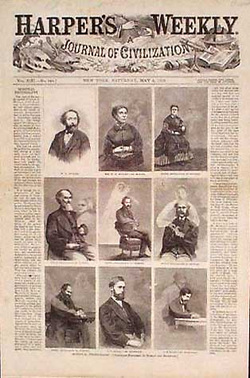William Mumler & Spirit Photography

Spiritualism in America--and more specifically, spirit photography-- was taken to court in New York City in 1869. The case: a preliminary hearing for William H. Mumler, who was charged with fraud for selling photographs that he claimed included images of ghosts or spirits. Testimony and arguments lasted for seven days. On Mumler's side, witnesses included a prominent former judge who was also a spiritualist. Among the opposing witnesses were several photographers who explained how the same effects could be achieved by darkroom tricks, and P. T. Barnum--who said he purchased some of Mumler's photographs to exhibit them in his museum as specimens of humbug.
The hearing attracted nationwide attention, including the full cover page (and back-page cartoon ) of the mass circulation Harper's Weekly.
In the end, the judge in the case reluctantly decided to drop the charges against Mumler, citing a lack of evidence. According to The New York Daily Tribune, the judge explained "however he might believe that trick and deception had been practiced [by Mumler], yet, as he sat there in his capacity as magistrate, he was compelled to decide...the prosecution had failed to prove the case."
Both sides were thus able to declare victory. The prosecution had exposed Mumler, revealing that the same "ghost" appeared in certain photographs taken in Boston and New York-- a "spirit" who turned out to be very much a living mortal.
Mumler went back to spirit photography and gloated a bit in a pamphlet he published in 1875. But his brush with the law took its toll, both to his reputation and to his finances. Mumler never recovered from the $3000 cost of his defense, a staggering sum for its day. He destroyed all of his negatives shortly before his death in 1884.
*Information obtained from www.photographymuseum.org*
The hearing attracted nationwide attention, including the full cover page (and back-page cartoon ) of the mass circulation Harper's Weekly.
In the end, the judge in the case reluctantly decided to drop the charges against Mumler, citing a lack of evidence. According to The New York Daily Tribune, the judge explained "however he might believe that trick and deception had been practiced [by Mumler], yet, as he sat there in his capacity as magistrate, he was compelled to decide...the prosecution had failed to prove the case."
Both sides were thus able to declare victory. The prosecution had exposed Mumler, revealing that the same "ghost" appeared in certain photographs taken in Boston and New York-- a "spirit" who turned out to be very much a living mortal.
Mumler went back to spirit photography and gloated a bit in a pamphlet he published in 1875. But his brush with the law took its toll, both to his reputation and to his finances. Mumler never recovered from the $3000 cost of his defense, a staggering sum for its day. He destroyed all of his negatives shortly before his death in 1884.
*Information obtained from www.photographymuseum.org*
